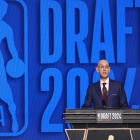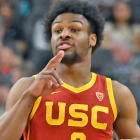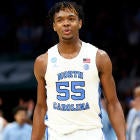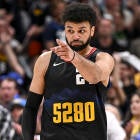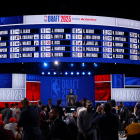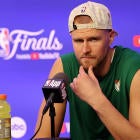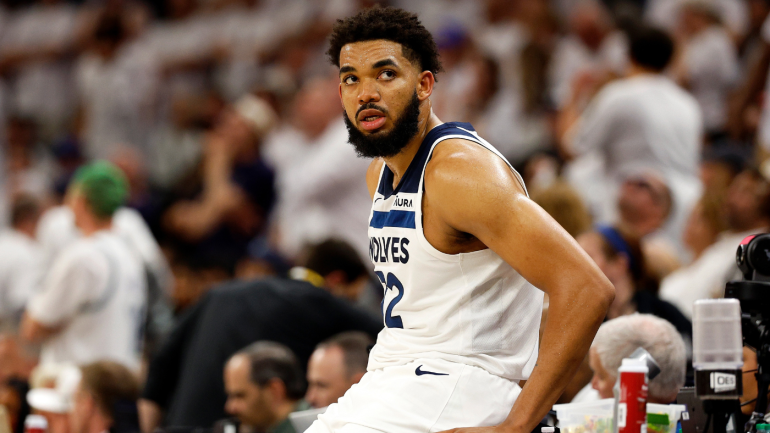
Karl-Anthony Towns was an essential component of perhaps the single biggest victory in Minnesota Timberwolves history. Let's be absolutely clear about that. Towns was the primary defender of Nikola Jokic as the Timberwolves stunned the defending champion Denver Nuggets to reach the 2024 Western Conference finals. The notion that this roster was built to beat the Nuggets, specifically, hinged as much on Towns as it did on Rudy Gobert and Anthony Edwards. The self-described greatest shooting big man in NBA history was an absolute necessity in keeping the Timberwolves' offense viable against some of the biggest lineups in the league. Minnesota's season would have ended weeks ago without him.
Weeks feel like years right now, because Karl-Anthony Towns was awful in the Western Conference Finals. The Dallas Mavericks posed a number of unsolvable matchup problems for Minnesota, but Towns wasn't supposed to be one of them. No. He was supposed to feast on the smaller P.J. Washington and help Minnesota own the glass against a Mavericks team that hadn't really been tested inside yet this postseason. Instead, well, you watched the games. Towns shot 33-of-87 in the Western Conference Finals. Minnesota lost his minutes by 16 points. Naz Reid closed Game 2 over him. He offered little defensively.
This is largely who Towns has been for his entire career, a star as talented as he is inconsistent. In the 2022 and 2023 playoffs, he scored 15 or fewer points in four of his 11 games, but 25 or more in five of the remaining seven. He has more playoff games with four or more fouls (18) than three or fewer (14). Minnesota has lost his minutes in 20 of his 32 playoff games. For most of NBA history, you just lived with this. Max-level talents were so rare and so valuable in their best moments that you gritted your teeth through their inconsistencies and blindly paid them at every opportunity.
That isn't the NBA we live in anymore. The 2023 CBA was designed to break up teams like the Timberwolves. As of this writing, Minnesota has roughly $193 million in committed salary for next season, a figure that jumped by roughly $7 million when Edwards earned All-NBA honors.
The Timberwolves only have 10 players under contract at the moment. Even if they filled out their remaining slots with minimum salaries rather than re-signing key free agents like Kyle Anderson and Monte Morris, their final payroll, before trades, is almost certain to come in at around $200 million. Such a payroll would also incur a luxury tax payment in the $70 million range, depending on the final numbers. All told, that would make the 2024-25 Timberwolves one of the most expensive rosters in NBA history.
There's never been a worse time to have one of the most expensive rosters in NBA history. The harshest restrictions of the second apron kick in when the calendar turns to July. Teams above that projected $189 million line will no longer have access to the tax-payer midlevel exception. They won't be able to aggregate salaries in trades, or take back a cent more in deals than they send out. Their draft picks get frozen at the end of the first round, and starting in the 2025-26 season, their tax bills get a whole lot heftier.
Maybe Joe Lacob or Steve Ballmer would be comfortable navigating that reality. It's hard to believe that Minnesota's ownership will be. We don't even know who's going to own this team when the dust settles. Incumbent owner Glen Taylor has paid the luxury tax only once since the league adopted its more punitive format in 2011, and even then, during the 2019-20 season, Minnesota was just barely beyond the line.
Possible newcomers Alex Rodriguez and Marc Lore are even scarier. A report from ESPN's Adrian Wojnarowski claimed that documents Lore and Rodriguez shared with the NBA and the Carlyle Group, a private equity firm that would have been involved in their purchase for the team, rendered a budget for next season that included a projected payroll of $171 million, or $1 million below the expected $172 million luxury tax line. That would mean slashing payroll by roughly $30 million.
There isn't $30 million in superfluous salary here. Frankly, the majority of Minnesota's roster is underpaid. If the Timberwolves made Jaden McDaniels ($22.5 million salary for next season), Naz Reid ($14 million) or Mike Conley ($10 million) available in cap dumps, they'd have a line of suitors around the block. All three are completely essential to Minnesota's playing style and irreplaceable at their current prices. Gobert is the Defensive Player of the Year on a team designed to win defensively. He's not going anywhere. Edwards is the face of the franchise.
That pretty much just leaves Towns. He is Minnesota's only path to savings, but also its only path to meaningful change. Is change—regardless of price—a necessity? Well, that's a matter of debate.
The Timberwolves beat the defending champion Nuggets. That would seem to indicate that they have a championship-caliber roster. The trouble is that several of those can exist at a time. Dallas has one too, and it matched up quite well against Minnesota's. The Timberwolves could have overcome their weaknesses against the Mavericks with Towns playing at somewhat closer to his best. Instead, his struggles may have cost Minnesota its best chance at winning the whole thing.
Maybe Towns could be dealt for pieces that reconfigure the matchup equation in a favorable way against Dallas. Turn him into a wing defender more like Lu Dort that is strong enough to hold his own with Doncic and perhaps a rematch goes differently. Of course, take that route and the size that made beating Denver possible is suddenly gone and you've effectively solved one problem by creating another. Or maybe he could be traded for a younger, score-first point guard. The Timberwolves ranked 17th in offense this despite paying Towns, an offense-first big man, the max. It's worth wondering how much he's really needed in most matchups when Reid does similar things for one-third of the price.
Of course, if the Timberwolves are thinking about that, so is the rest of the league. Think about some of the players populating this offseason's trade market. Trae Young, Brandon Ingram and Zach LaVine -- no-brainer max contracts in the old world that are struggling to generate substantial interest at the moment because of their contracts. Edwards justifies a max offensively. Gobert does so defensively. It's unclear where exactly Towns did this postseason, and he has four years of money awaiting him. If Towns isn't a max player, how many teams are going to want to pay him max money?
Part of what justified the risk of the very pricey Gobert trade two summers ago was the idea that if it didn't work out, the younger Towns would be able to get them a similar asset package back. That might not be the case anymore. How many teams a) are interested in paying Towns four years of supermax money, b) have win-now players to send back to Minnesota and c) have those win-now players on contracts that would save the Timberwolves money?
The obvious answer is none. Maybe you could stretch it a little bit. How badly do the Knicks want to upgrade on Julius Randle? There's a pretty easy scenario here in which Minnesota swaps Towns for Randle and Bojan Bogdanovic along with some draft capital with the idea that it can just pay for a $30 million power forward next season instead of a $50 million big. Towns, both a CAA client and Kentucky alum, has long been in the orbit of New York's power brokers. It's hard to believe the Knicks wouldn't have grander trade ambitions, and Towns' first go-round with Tom Thibodeau didn't end well.
Oklahoma City's desire to play five-out offensively makes Towns an interesting fit. A literal Dort-centric trade might even make some basketball sense here, as the Thunder both have the cap space to absorb a sizable contract and have Cason Wallace waiting in the wings to replace him. But the Thunder have their own long-term financial issues to consider. They have a two-year window before Chet Holmgren and Jalen Williams are making max money. It's hard to imagine them paying both, Towns and Shai Gilgeous-Alexander at the same time.
Miami tends to be open-minded about stars, but the Towns-Jimmy Butler pairing didn't work in Minnesota, and even if Butler is dealt as has been rumored, Towns and Bam Adebayo overlap. There are tempting basketball reasons for New Orleans to swap Ingram for Towns, but the Pelicans, like the Timberwolves, are trying to save money rather than spend it. Maybe one of the asset-rich lower-class teams trying to make a jump takes a talent swing? Houston has been big-game hunting lately. Utah always is. Maybe there's a mystery front office like Charlotte's or Detroit's that is dealing with enough ownership pressure to just bet on the talent.
But there's not a cozy fit here. Minnesota's problem isn't unique. Half of the league is panicking over contracts it handed out before this new CBA made them toxic. The sport is changing, and nobody quite knows what exactly it is changing into. All we can say for certain is that winning a championship with a max player performing in the playoffs as Towns did against Dallas is functionally impossible.
Keeping players like that is about to become so prohibitively expensive in terms of opportunity cost elsewhere on the roster that anyone earning max money has to come with max production. Towns didn't against Dallas. That's why the Timberwolves aren't preparing for the Finals right now, and if they don't figure out some way to maximize him either on the court or through a trade, they may never get another chance like the one they just squandered.











